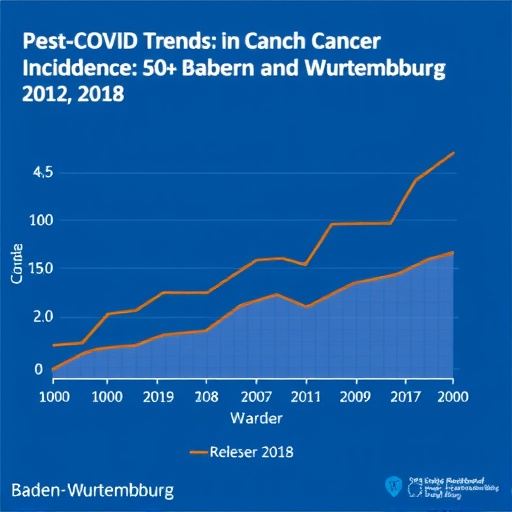During the unprecedented times marked by the COVID-19 pandemic, significant shifts in health patterns emerged across the globe, prompting a surge of interest in understanding the long-term implications on various health metrics, particularly cancer incidence. A recent study conducted in Baden-Württemberg, a region in Southwest Germany, meticulously analyzed cancer incidence trends during and after the pandemic years spanning from 2020 to 2023. This research offers essential insights into how a global health crisis can disrupt cancer diagnosis and treatment, leading to profound societal and medical consequences.
The researchers, led by L. Jansen, alongside colleagues S. Hermann and S. Bergbold, delved into the intricate dynamics of cancer reporting and management as healthcare systems faced unprecedented strains. The COVID-19 pandemic resulted not only in direct health impacts from the virus but also led to significant disruptions in preventative healthcare and routine medical services. Many patients delayed seeking medical attention due to fears of virus transmission within healthcare facilities, a phenomenon observed globally. This behavioral shift is hypothesized to have profound implications on cancer detection and treatment timelines.
The research provided a detailed statistical analysis of cancer incidence rates from various types of cancers in the Baden-Württemberg region, comparing the pre-pandemic era with data following the onset of COVID-19. The authors meticulously gathered data from regional cancer registries, examining a broad spectrum of cancers including breast, colorectal, and lung cancers. Each of these cancer types presents unique challenges in detection and treatment, influenced heavily by patient access to healthcare during a pandemic.
One of the striking findings was the notable dip in new cancer diagnoses during the peak periods of the pandemic. The study revealed that many patients were not screened or diagnosed as early as they would have been in a typical healthcare environment. For instance, breast cancer screenings saw a dramatic reduction, which might lead to late-stage diagnoses, demonstrating the need for a robust response to re-engage patients in preventive care. The results emphasize the vulnerability of cancer patients during health crises, making a compelling case for increased public health communications emphasizing the importance of regular screenings even during challenging times.
As the pandemic receded, the researchers observed a gradual increase in reported cases of cancers, giving rise to discussions about a potential backlog of undiagnosed cases. This phenomenon raised alarm regarding an impending rise in advanced cancer cases, which could bear severe repercussions on treatment outcomes. The authors projected a need for adaptive healthcare strategies to address potential spikes in late-stage cancer presentations, as healthcare providers navigated the challenges of managing an influx of new patients alongside ongoing treatment obligations for existing cancer patients.
Moreover, the study explored demographic variables, identifying disparities in cancer incidence trends among different age groups and socioeconomic backgrounds. The findings suggested that groups with lower socioeconomic status or living in areas with limited healthcare access faced even greater challenges during the pandemic. This raises critical questions about equity in healthcare access, further underscoring the need for targeted interventions to ensure that vulnerable populations receive necessary screenings and treatments in the aftermath of such global events.
In light of the findings, the authors did not simply present data but emphasized the dire need for health policy adaptations. The pandemic illustrated the necessity for resilient healthcare systems capable of weathering unexpected stresses, leveraging technology to enhance patient engagement and support cancer care. Telemedicine, which saw a surge in adoption during the pandemic, may become an indispensable tool for cancer follow-ups, allowing providers to maintain continuity in patient care while addressing physical access limitations.
Importantly, the research also highlighted the psychological impacts of cancer diagnosis disruptions during the pandemic. Cancer patients and survivors reported increased levels of anxiety and depression, exacerbated by the uncertainty surrounding their health during the pandemic. The study advocates for integrating mental health support within cancer care systems, particularly in the context of global health emergencies, to ensure holistic patient care and promote better health outcomes.
In conclusion, the study on cancer incidence trends in Baden-Württemberg serves as a critical case study emphasizing the importance of ongoing public health engagements and proactive strategies in managing cancer care amid and beyond global health crises. As society gradually recovers from the pandemic’s immediate effects, stakeholders must remain vigilant in understanding these long-term trends, crafting robust health policies informed by such research. This will not only inform cancer care moving forward but will strengthen public health responses to address the multifaceted challenges posed by future health emergencies.
Moving ahead, it is imperative for the scientific community, healthcare policymakers, and stakeholders to collaborate on initiatives that prioritize cancer screening and treatment as societal health needs evolve. Continuous research in this area will illuminate the lingering effects of the COVID-19 pandemic on cancer epidemiology, helping to fortify cancer care against the backdrop of future health crises.
This collective understanding will guide both immediate responses and long-term strategies to adapt to the new normal, ensuring that cancer patients are not left behind in the scramble for healthcare resources, as lessons from the COVID-19 pandemic shape the future landscape of oncology.
Subject of Research: Cancer incidence trends in Baden-Württemberg during and after COVID-19 pandemic
Article Title: Cancer incidence trends in Baden-Württemberg (Southwest Germany) during and after the COVID-19 pandemic (2020–2023)
Article References:
Jansen, L., Hermann, S., Bergbold, S. et al. Cancer incidence trends in Baden-Württemberg (Southwest Germany) during and after the COVID-19 pandemic (2020–2023). J Cancer Res Clin Oncol 151, 300 (2025). https://doi.org/10.1007/s00432-025-06349-w
Image Credits: AI Generated
DOI:
Keywords: Cancer incidence, COVID-19, healthcare access, cancer screening, public health, epidemiology, mental health impacts, cancer survival, socioeconomic disparities.




